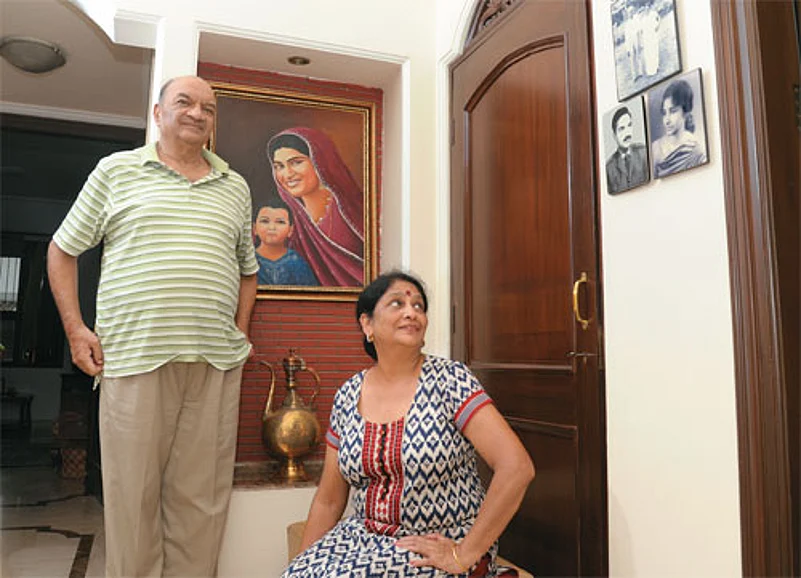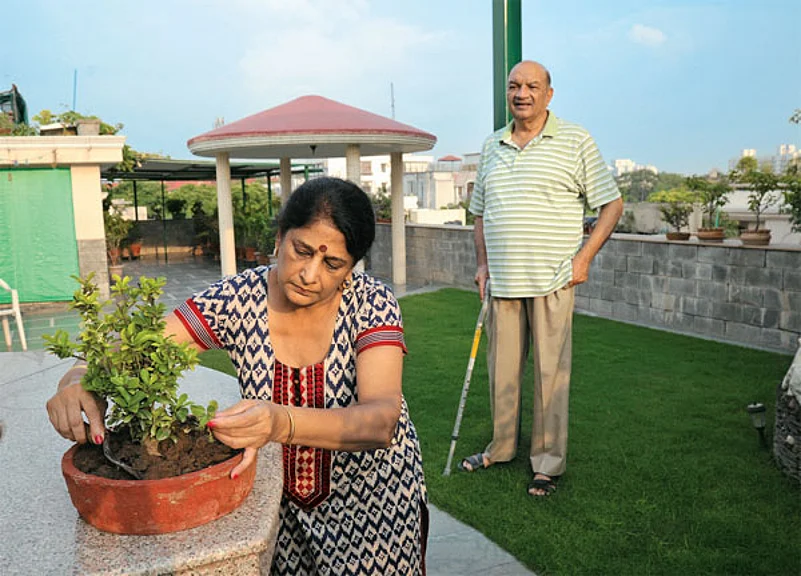At 70, retired Indian Army Captain Vijay Neil Kumar can give people half his age a complex with the spring in his step and his zest for life.

Yes, the army background helps, but his is a story of a life that has adapted to changing seasons and circumstances to come out unscathed. “I attribute it all to my wife Renu, who deserves all the credit for what we have achieved,” he says with pride. Today, the Kumars live their retired lives in Safdarjung Development Area in Delhi. The décor of the living room, complete with paintings and artifacts—some dating back a hundred years or so—reflect his taste.
Fifty years ago, Kumar was commissioned into the army after four gruelling years of training. “I always wanted to be in the army as a child,” he says with a glint in his eye. He recalls he stood sixth in the merit list of 300-odd participants. He remembers he was posted at higher altitudes in Sikkim (at Nathula) and he vividly recalls the days when the roads were closed due to snow and food was air dropped only when the skies cleared. Hailing from Uttarakhand, Kumar is father to three daughters, all of whom are settled abroad.
“Our three daughters, Shalini, Shibani and Arti, are all in their 40s and between them we have five grandchildren including three boys and two girls—Arnav, Arav, Arjun, Amisha and Aakriti,” he beams with pride. The framed picture of the entire family adorns the wall of their living room and the smiles on their faces tell the story of three happy generations. The Kumars are proud grandparents and adore their grandchildren, and spend a lot of time with them when they visit India or when the Kumars visit their daughters. “All my grandchildren are very naughty. While the boys enjoy cricket, golf, football and other sports, the girls spend more time with their grandmother reading, staging plays and going out shopping with her,” says Kumar.
A twist in the tale
Five years after being commissioned in the army, Kumar had to take an early retirement to tend to his ailing father. “I knew I had to come back and look after him, and also manage his farm,” he says with a tinge of sadness. Although he had no clue about farming, he got his act right and decided to not just manage the farm but also start a business in agricultural seeds. In due course, the Kumars had their three daughters during their stay in Uttarakhand. It was in 1993 that the family shifted to Delhi, when his daughters were ready to go to college.
While his elder daughters Shalini and Shibani finished their college in Delhi and started working, Arti went to USA to pursue her MBA. “She got an 80 per cent scholarship and I just about had the money to fund the rest of her education, and to accompany her to the US and get her settled there,” he says. The daughters had a good childhood and the Kumars were open-minded about their daughters going out, with minimum interference on their part.

Around this time, Kumar invested in a couple of flats in south Delhi area and in another house in Greater Noida, as the property rates were low at that time. He stayed at his Hauz Khas apartment for a while before he moved to a rented accommodation. “We purchased this home in Safdarjung Development Area in 2003. I purchased it outright for Rs.1.5 crore and, since then, its value has been appreciating at an average of Rs.1 crore a year. In Delhi, there is a problem of shortage of water and parking space. I am lucky to have a house where both these are taken care of,” he says.
Moneywise
Even when he was in Uttarakhand, after the birth of his daughters, Kumar started investing his surplus income into recurring deposits. He recalls that his first investment in a recurring deposit started with Rs.200. Over the years, when these matured, he invested the money into fixed deposits. He also marginally invested into equities, but since he did not find much time outside of his business to look after his investments, they did not generate very good returns.
He has astutely handled his money, which is evident from the way he has gone about his finances. Being the only income earner to support four financial dependents, he had taken significant life insurance as early as in 1965. “They have all matured over the years, including the one that I had taken in 1965,” he says. Four years ago, he purchased a Max Bupa Health Insurance cover of Rs.25 lakh for himself and his wife.

The high cover ensures that the couple will be covered for any medical emergencies in the future, but it also entails a high premium payout. “Insurance premiums have gone up quite a lot over the years,” he says. Not the one to leave things to chance, Kumar has also made a Will, which distributes all his wealth among his three daughters.
Now that he is retired and not actively involved in his business, he spends a lot of time reading books and catching up on the latest movies at multiplexes with his wife. “You need to know how to unwind and what better way than spending time with my wife,” he winks. Spending time with old friends from the army when they come over is also among his favourite pastimes.
A disciplined fitness regime includes golf sessions in the morning and long walks in the evening with his wife. The couple also spends a significant time tending to their terrace garden and plants, the farmer in Kumar does not leave his love to be in the green and get his hands to feel the mud and smell the plants. Theirs is a definitely well-sowed dream that has turned into reality with hard work and meticulous planning.
Exiting on your terms
Family circumstances made Kumar take an early retirement from the army in 1970, which also meant he took over the existing family business of farming. “I knew nothing of farming but was willing to learn about it,” he says. He developed an interest soon and decided to start a business in agricultural seeds. “I was one of the first to venture into the seeds business in my area,” he says. The idea was to produce seeds that were conducive to the area, package them and sell them. He started small and reinvested the profits into the business to make it bigger till he had processing plants in Uttarakhand, Varanasi and Kanpur. At the peak of his business, the seeds produced by his company were sown in over 11,000 hectares of land, including 45 acres of his own land.
But, like several other business owners, he too eventually wanted to leave his business. However, few plan properly for succession or an exit on their own terms. Thankfully for Kumar, he was able to exit the way he wanted. “It was not easy and it was time consuming, but it was worth the effort,” he recounts. His first piece of advice is that it is never too early to start thinking about exiting your business. It is also important to realise that succession and exit planning is not a single event but a deliberate, tailored process that requires planning, teamwork and constant re-evaluation.
A valuable side effect of the exit planning process is that it can help you to identify and set your own unique personal and financial goals, and decide how best to achieve them. An exit plan can also help to maximise your financial return when you transfer your business while minimising your tax liability. Captain Kumar sold off his business in 2009 and it took almost a year for the process to close.
The exit left him with a large corpus of money, which he needed to manage to provide him a steady income in his retirement. Instead of managing the money on his own, he hired Gurgaon-based Sapna Narang to understand his needs and help him tailor a financial plan that suited him perfectly. “About 75 per cent of my money is in tax-free bonds, which generate guaranteed income, and 25 per cent is in equity to give the corpus the necessary growth kick,” Kumar says. It is a plan that he is pleased with and finds it perfectly working out for him.































